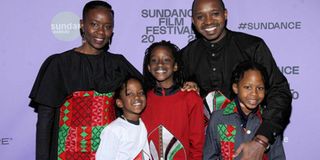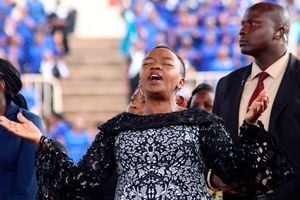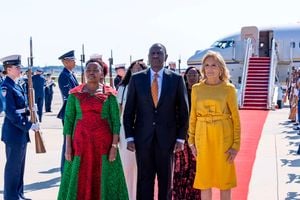Boniface Mwangi's 'Softie' qualifies for Oscars consideration

Activist Boniface Mwangi with his wife Njeri Mwangi together with their children Jabali Mboya Mwangi, Nate Siphiwe Mwangi and Naila Sifa Mwangi when Softie premiered at the 2020 Sundance Film Festival in New York City on January 25, 2020.
What you need to know:
- The film chronicles a seven-year journey beginning with chaos-filled street protests and culminating in Mwangi’s decision to run for a political seat in his old neighbourhood Starehe in Nairobi.
- After winning the Best Documentary at the Durban International Film Festival 2020, Softie qualified for consideration for the Oscar documentary shortlist for the 93rd Academy Awards ceremony
Softie, a film about the life of activist Boniface Mwangi has made it to the 2021 Oscars shortlist in the category of Best Documentary Feature.
Directed by Sam Soko, Softie is among more than 40 documentaries in that category. It follows the life of the activist and his wife Njeri, as well as their children.
The film chronicles a seven-year journey beginning with chaos-filled street protests and culminating in Mwangi’s decision to run for a political seat in his old neighbourhood Starehe in Nairobi. He soon finds that challenging strong political dynasties is putting his family at risk.

Activist Boniface Mwangi and his wife Njeri on the campaign trail at Industrial Area, South B in 2017 when he ran for Starehe parliamentary seat.
His wife, Njeri, has long been silent in the background. Her husband’s decision to run for political office put her and the family on the spot.
This brings forth a central question that many of the world’s brightest and most effective change makers have had to ask themselves, ‘What comes first – family or country?’
The documentary first premiered at Sundance in January 2020, winning a special jury prize for editing. It has been greatly reviewed, citing its conscientious story telling of Kenya’s struggle with political tribalism.

Activist Boniface Mwangi and his wife Njeri distributing leaflets in Nairobi's Mukuru kwa Njenga slums during his campaign for the Starehe parliamentary in 2017.
It will premiere nationwide in Kenya, starting this Friday in Eldoret (Rupa Cinema), Mombasa (Nyali Cinemax), Kisumu (Mega Cinema) and at Prestige Cinema, Anga Diamond Plaza, Motion Cinema and Westgate Cinema in Nairobi.
After winning the Best Documentary at the Durban International Film Festival 2020, Softie qualified for consideration for the Oscar documentary shortlist for the 93rd Academy Awards ceremony, presented by the Academy of Motion Picture Arts and Sciences.
The next ceremony is scheduled to take place at the Dolby Theatre in Hollywood, Los Angeles, California on April 25, 2021.
Prestigious festivals
Softie has since been played at several prestigious festivals including CPH:DOX, FullFrame and even won Best Film at the Encounters International Documentary Festival.
Softie was also the opening night film at the Hotdocs Film Festival and at the Human Rights Festival held in Berlin, Germany, under the patronage of Nobel Peace Prize Laureate Nadia Murad, with opening and keynote speeches having included former Secretary-General of the United Nations Ban Ki-moon.

Sam Soko (center, background), who directed the film 'Softie' with Boniface Mwangi, his wife Njeri and the couple's three children when the film premiered at the 2020 Sundance Film Festival in New York City on January 25, 2020.
Softie started coming together after director and producer Sam Soko met Mwangi in 2013. Soko, who had directed several short music videos and films, decided to try his hand at directing a documentary.
What started out as a short video, for which he had planned to take a year filming, evolved into a story about politics, family and what it means to be Kenyan, becoming Soko’s first feature documentary filmed over five years.
Even though he had a possible ending for the film, Soko pushed to do one more year of filming, as the political campaign would give insight into the political and voting process in Kenya.
But the material he filmed went far beyond that and gave insight into a young family, in a young democracy that was struggling to balance their love for their country with their needs.




